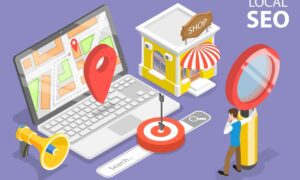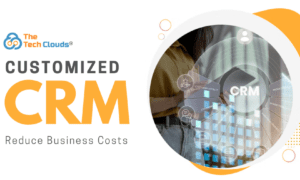Small businesses face numerous challenges to grow their business in this competitive market. Limited resources, intense competition, and the need to provide exceptional customer service are just a few hurdles they need to overcome to establish their brand. And Customer Relationship Management – CRM Software comes into play in this situation. It’s a myth that CRM is just a tool for large enterprises, but in reality, it is equally essential for small businesses. Customer relationship management is essential to a company’s success since it boosts revenue, retains current clients, and fosters customer loyalty.
Thus, in this article, we will study the need for CRM in small businesses and highlight its importance in streamlining success.
When should Small Businesses go for CRM implementation?
As can be noted, according to Harvard Business Review research, growing customer retention rates by just 5% can lead to a rise in profits by 25% to 95%.
A study conducted by Nucleus Research found that CRM software can increase sales productivity by an average of 15%.
In simple terms, there aren’t many clients for new businesses to compete with. Therefore, it makes sense for these companies to implement several strategies to build trust and forge lasting relationships with their current and prospective clients. Certainly, small businesses do not have the benefit of having a large number of customers who have grown into long-term clients and the resources to serve them. To guarantee consumer happiness and satisfaction, they should therefore be looking for strategies to maximize and nurture any leads they receive.
Here are a few factors small businesses should not avoid and should implement CRM when:
- The volume of leads is too great for you to handle.
- You have trouble finding your data.
- You need to manage several important, long-term accounts.
- Your marketing and sales departments are not cooperating.
- Customers can’t get prompt, accurate responses from your customer service personnel.
- You are unable to grow your company.
Let’s Define the CRM:
Customer Relationship Management or CRM software is a tool that is not only used for customers but rather helps in the entire business workflow and watches out the sales activities. CRM software enables small businesses to build stronger relationships with their customers by providing personalized experiences, timely follow-ups, and proactive customer service. By leveraging CRM, small businesses can enhance customer satisfaction, increase loyalty, and ultimately retain valuable customers.
CRM solutions streamline the sales process by providing centralized customer data, tracking leads, automating follow-ups, and providing insights into customer preferences and buying behaviors. It enables sales teams to prioritize their efforts, improve lead conversion rates, and close deals more efficiently.
Now, let’s study why CRM is important and a need for small businesses.
Customer Relationships become stronger:
At the heart of any successful business lies strong and enduring customer relationships. CRM systems empower small businesses to centralize customer data, enabling them to understand their customers better. By collecting and analyzing customer information such as preferences, purchase history, and communication records, businesses can customize their offerings to meet individual needs. This personalized approach promotes trust, loyalty, and customer satisfaction. As a result, it leads to increased retention and positive word-of-mouth referrals.
Sales and Marketing increase revenue by monitoring the sales activities:
CRM offers small businesses a comprehensive platform to manage their sales and marketing activities more efficiently. In short, it helps in sales planning and evaluating sales performances with real-time reports. Moreover, it enables them to track leads, manage pipelines, and automate follow-ups, ensuring that no opportunity falls through the cracks. We can get proof that, with integrated analytics and reporting features, CRM systems provide valuable insights into sales trends and customer behavior. Thus it enables businesses to make informed decisions and optimize their marketing strategies. This data-driven approach maximizes efficiency, minimizes costs, and boosts revenue generation.
Streamlined Communication enhances collaboration among sales team:
In small businesses, effective communication is crucial for success. CRM solutions serve as a centralized hub for all customer interactions, enabling seamless collaboration among team members. Whether it’s sharing customer notes, assigning tasks, or tracking progress, CRM has communication channels, that ensure that everyone is on the same page. Moreover, CRM platforms often integrate with email and social media, facilitating quick and personalized communication with clients. This seamless communication flow enhances team productivity, minimizes errors, and strengthens customer satisfaction. They collaborate and work on the tasks assigned particularly to the different roles.
Improved Customer Service satisfies customers:
Small businesses often struggle to provide exceptional customer service because of limited resources and staff. However, CRM software levels the playing field by automating routine tasks and providing valuable customer insights. With CRM, small businesses can respond promptly to customer inquiries, address concerns, and provide personalized support. Additionally, CRM systems enable small businesses to implement effective customer service strategies, such as case management, ticketing systems, and self-service portals. These features not only enhance customer experience but also reduce the workload on support staff. Thus this process enables them to focus on complex issues and build stronger relationships with customers.
Data-Driven Decision-Making becomes easy and quick:
Data is a goldmine for businesses, regardless of their size. By all means, CRM systems help small businesses harness the power of data by collecting, organizing, and analyzing customer information. This data-driven approach allows companies to identify trends, measure campaign performance, and anticipate customer needs. By making informed decisions based on accurate data, small businesses can allocate resources effectively, optimize marketing campaigns, and tailor their offerings to match customer preferences. Finally, the result is increased efficiency, reduced costs, and better outcomes.
Scalability and Growth help in the expansion of business:
One of the primary goals of any small business is growth. Every enterprise wants to reach the highest peak in its industry. CRM systems provide the scalability required to support expansion. As a business grows, CRM platforms can seamlessly accommodate increased customer data, transactions, and team members. This scalability ensures that small businesses can continue to provide excellent customer service and manage their operations effectively as they expand their customer base and enter new markets. CRM software enables companies to identify upselling and cross-selling opportunities, further driving growth and revenue.
Sales Performance is on the top:
CRM frees you from having to watch over your email by automatically populating client profiles with data, scheduling mailouts, and more. It manages your schedule and keeps an eye on your agenda. Large mailouts and email templates save time because you can send many emails at once rather than just one. Simply put, CRM frees up your time for more crucial tasks, including determining your clients’ wants or generating sales.
Customer Relationship Management (CRM) is not a luxury reserved for large enterprises; it has become a need for small businesses seeking to thrive in a competitive market.
Sales CRM allows you to work while on the go when downloaded on your smartphone. Any mobile device can access customer databases, which provide highlights of any prior discussions. As a result, you are constantly ready to close the deal.
By investing in a CRM solution tailored to their specific needs, small businesses can unlock their full potential and pave the way for long-term success in today’s dynamic business landscape.
Emerald Software stands out as the leading accounting software provider. With its advanced features, customizable options, and expertise in Tally ERP, QuickBooks, CRM, HRMS, ERP Software UAE, hardware, web designing, and development, Emerald offers comprehensive solutions tailored to businesses of all sizes in UAE. Emerald CRM is an exceptional CRM software solution that empowers businesses to build stronger customer relationships, streamline operations, and drive growth. With its comprehensive feature set, user-friendly interface, and commitment to data security, Emerald CRM has earned its reputation as one of the best CRM software options available.



































